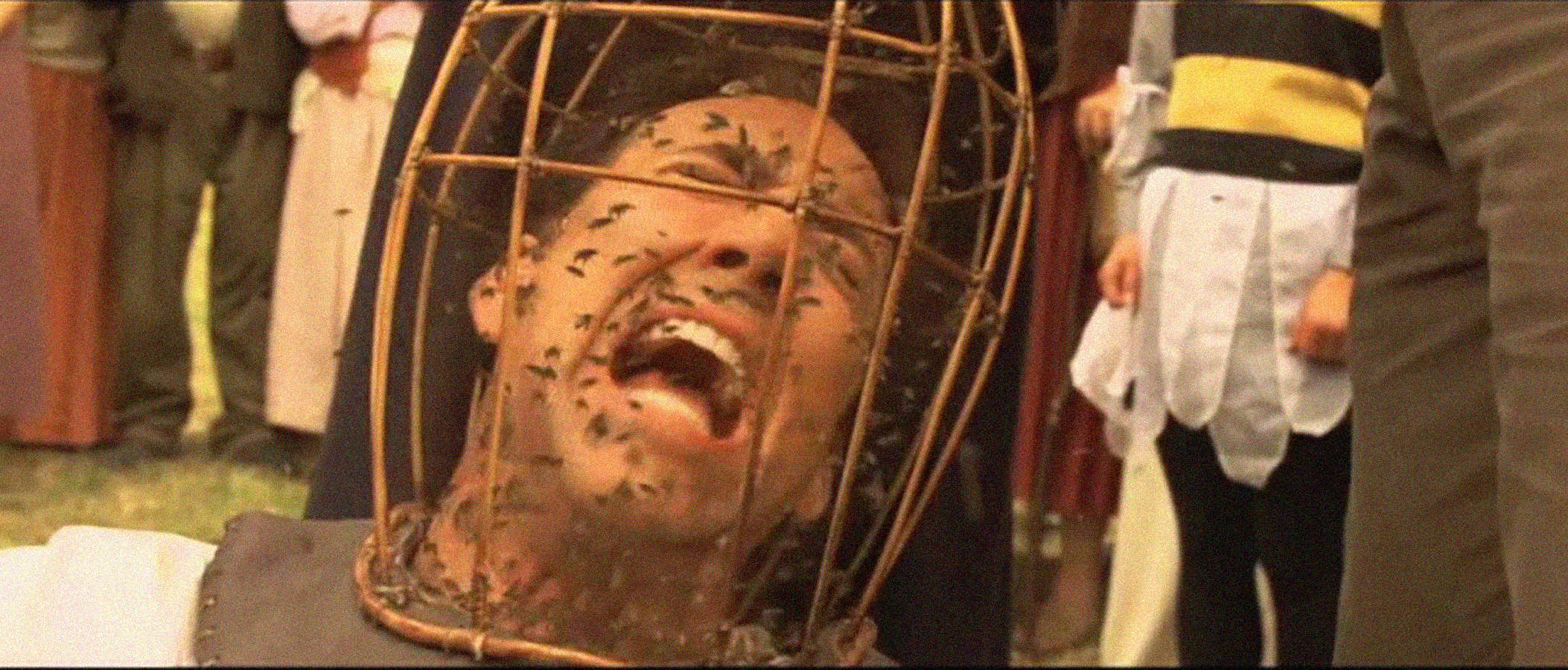Create a free profile to get unlimited access to exclusive videos, sweepstakes, and more!
This Week in Genre History: The Wicker Man redefined what a 'bee movie' was

Welcome to This Week in Genre History, where Tim Grierson and Will Leitch, the hosts of the Grierson & Leitch podcast, take turns looking back at the world’s greatest, craziest, most infamous genre movies on the week that they were first released.
For the record, they knew the bear costume was funny, too. “Wicker Man is probably the best example of a movie where people are mystified because they think for some reason that we did not know it was humorous,” Nicolas Cage said in 2013, “even though I am dressed in a bear suit, doing these ridiculous things ... how can you not know that Neil and I knew that this was absurdist humor?”
The Neil he’s referring to, writer-director Neil LaBute, has also talked about his terribly received remake of a 1970s British horror classic — and how humor was always part of its makeup. “You know, we were fully aware that this guy is running around in a f***ing bear suit,” the filmmaker said with a laugh during a 2017 interview.
When people think about The Wicker Man, which was dropped into theaters on Sept. 1, 2006, the image of Cage in that bear suit often comes to mind. Or maybe it’s Cage screaming about a burned-up doll. But, really, it’s the bees. That’s what everyone talks about. “NOT THE BEES!!!!”
A commercial disaster that was savaged by critics, this moody thriller — or was it an unintentional comedy? — starred Cage as Edward, a tormented California cop who, after failing to save a mother and daughter from a burning car, receives a letter from his estranged ex-fiancée Willow (Kate Beahan). She informs him that she’s returned to her hometown of Summersisle, an island in Puget Sound, and, oh yeah, she now has a daughter, Rowan, who’s missing. On leave from his job because of that traumatic automobile accident, Edward travels to Summersisle to find the girl, only to discover that the island is populated by a fiercely private and protective matriarchal society. The creepy women on the island don’t want Edward around, and they’re definitely not interested in helping him with his search for Rowan.
Now hailed as a camp masterpiece, The Wicker Man is one of those weird misfires that’s clearly got ideas and ambition — you can see the film that LaBute and Cage wanted to make. But because they tried so hard, their failure ended up being more spectacular as a result. Truth is, The Wicker Man isn’t actually terrible, but the ways in which it’s not good give the film its sneaky, unexpected resonance. Lots of bad movies are merely forgettable. This one is a dud that’s actually about something.
Why was it a big deal at the time? By the early Aughts, Nicolas Cage had long since established himself as an award-winning dramatic actor and a bankable action star. In the 1990s, he’d won an Oscar for Leaving Las Vegas and become one of mega-producer Jerry Bruckheimer’s go-to leading men thanks to The Rock and Con Air. The next decade saw him continuing to move between those poles, earning praise for Adaptation while filling seats with National Treasure.
So there was reason to be intrigued when his production company Saturn Films signed on to do a remake of The Wicker Man, a 1973 British horror movie about a policeman who goes to a remote island to track down a missing girl, running smack dab into a pagan community that’s up to no good. A story of madness and grief, the film seemed like a good fit for an actor who values, beyond everything else, getting a reaction — even if it’s negative. “The artist is trying to evoke a response and the critic supplies it,” Cage once said. “It’s helped me deal with the fact that there are always going to be good and bad reviews. If you look at it as a response, then you can’t be elated or depressed by what is said.” Remarkably, he said that in 1986. Don’t act like Cage didn’t warn us from the start what kind of performer he’d be.
But the remake seemed like more of a curveball for LaBute, who wrote the adaptation and signed on to direct. A celebrated playwright whose films (In the Company of Men and Your Friends and Neighbors) divided audiences with their caustic studies of monstrous behavior, he wouldn’t necessarily be your first choice to do a horror movie. “It does fit within a kind of genre I’ve not done before,” LaBute admitted around the release of The Wicker Man. “While some might say, ‘Oh, [In the Company of Men] was a horror film,’ it really wasn’t technically one.”
But LaBute had a thought: What if you made the eerie cult led by women? Casting Oscar-winner Ellen Burstyn as the ruler of this strange island, LaBute reconceived the villains so that they represented a female-driven community that had always been fleeing persecution — first in England, then in Salem. And because he’s a filmmaker so well-known for his darkly comic depictions of toxic men, the idea that he’d do a movie in which the male cop is bedeviled by a horde of scheming women was inherently satiric — so why not embrace humor in the story?
“We thought: This is going to make people giggle,” LaBute once said about the remake’s outrageous tone. “They’re going to think this is funny, especially with Cage unleashed, doing his thing. But in the end, we’re gonna kill him.”
In other words, by adding a little levity and social commentary, maybe people wouldn’t be ready for the shock that was to come. Maybe audiences would be blindsided by the bees.
What was the impact? The Wicker Man opened on Labor Day weekend, usually a dumping ground for movies that studios know are terrible. In fact, the film wasn’t screened in advance for critics, who had their knives out for a stinker. “[LaBute] can’t even manage an effective false scare, or sustain suspense for more than a beat or two,” The New York Times’ A.O. Scott wrote. “Nor does the crude, sloppy look of the film turn into cheesy, campy excess. It’s neither haunting nor amusing; just boring.”
Audiences mostly stayed away, with the film ending up No. 3 for the weekend, behind the madcap action flick Crank and the inspirational Mark Wahlberg drama Invincible. With a reported $40 million budget, The Wicker Man made less than that worldwide, and when you consider that a lot of a movie’s box-office gross goes to the theater, well, this was a financial fiasco.
Pretty soon, though, The Wicker Man started developing a so-bad-it’s-good reputation, particularly for how hopped-up Cage’s cop character is as he goes around the island looking for the missing girl. In the theatrical cut, audiences didn’t actually see the now-famous scene where Edward gets a mask put over his face and the women dump bees inside. (As we learn earlier in The Wicker Man, he’s fatally allergic.) That scene was actually on the DVD, but once viewers caught wind of Cage going Full Cage, the internet went crazy for it.
By that point, though, the movie’s fate had already been sealed. The Wicker Man received five Razzie nominations — including Worst Screen Couple for Cage and the bear suit he wears near the end of the film to travel incognito — and the movie’s derisive reaction seemed to help permanently change audiences’ impression of Cage. From there, he’d do a series of questionable paycheck-grabbing gigs, which started to make sense when, in 2009, it came out that he owed more than $6 million in taxes. Soon, Cage’s gonzo onscreen excesses started to feel like pathetic self-parody. This was also around the time Andy Samberg started doing a Cage impression on Saturday Night Live in which he basically acted weird and bellowed at unpredictable moments. Eventually, Cage popped up on the show to play along with the gag.
In a sense, The Wicker Man cemented a new way of thinking about Cage — he was now more a walking meme machine than a legitimate actor. And that shift has weighed heavily on a guy who takes his work seriously, even if viewers don’t as much anymore.
“I’ve taken risks,” he told The New York Times in 2019. “But there has been a collision between the acting experiments and the memeification extrapolated from them. That has not been intentional. I have no social media presence. I’m not on Instagram. I am not on Facebook. I have no Twitter account. I genuinely am a private person who does not want his personal life exposed. I wanted to have the mystery of the old stars, always preserved in an enigmatic aura. It’s hard to do that now.”
Has it held up? Make fun as much as you want, but The Wicker Man is actually far more interesting than it’s given credit. Yes, the film isn’t very scary, and the parts that people always reference truly are ridiculous. But LaBute also seems to be exploring the flip side of the misogynistic men who are often at the heart of his work. Edward is placed in a nightmare scenario: He’s surrounded on an island he can’t escape by women who mean to do him harm. He may be a cop — he may think he has the law on his side — but he is actually helpless, unaware that these women laid a trap for him a long time ago when he first met Willow. That twist on the 1973 original could be seen as sexist or feminist — are the residents of Summersisle vindictive evil harpies or avenging angels lashing out at gender inequality? — and LaBute and Cage are clearly playing with cinematic stereotypes about macho male heroes and helpless damsels in distress.
“There was definitely an idea to make, not so much a cautionary tale, but to take this to its illogical conclusion, and have fun with it,” the filmmaker said a few years ago. “Put this guy in this position, the position that the young woman usually finds herself in — running through some town of backwoodsman [sic], and this guy who thinks he’s got the power of the police and the patriarchy and all of these things in his pocket. And then take those things away and put him on a bike and he’s running around on the island in his little shirt and tie.”
A mythic, primal idea resides at the center of The Wicker Man — the fear some men have of losing their status as the alpha — and the film toys with that in the same way that the women torment Edward, mocking his attempt to restore order and thwarting his investigation at every turn. Because LaBute isn’t a good enough thriller director — “I’ve now learned how difficult it is to make people scared when the sun is shining,” he said in the same interview, referring to the amount of daylight horror in his movie — his attempts at jump scares and eerie dream sequences are mostly just silly. But Edward’s slow realization that he’s about to be destroyed packs a punch — it feels like generations of women are rising up to finally get their revenge. Unfortunately, it required a better, more confident filmmaker to really make that punch land. Too bad this ambitious satire ended up just a bee movie.
Tim Grierson is the co-host of The Grierson & Leitch Podcast, where he and Will Leitch review films old and new. Follow them on Twitter or visit their site.



























